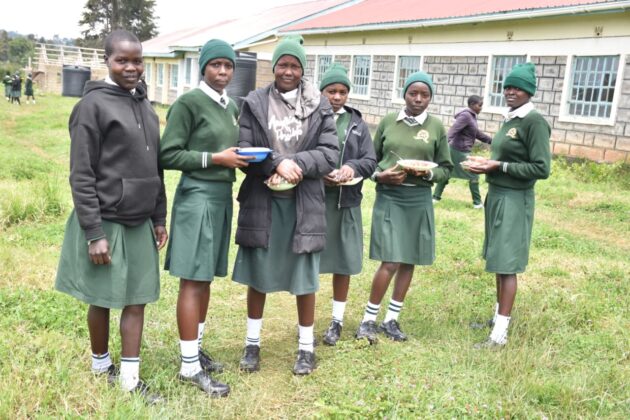
Feeding Programme Provides Lifeline for Students in Elgeyo Marakwet » Capital News
ELGEYO MARAKWET, Kenya, Sep 12 – Elgeyo Marakwet County, famed for its dramatic Rift Valley escarpments, is also grappling with a silent crisis: teenage pregnancies that threaten to rob young girls of education and entrench cycles of poverty.
In May, the National Syndemic Disease Control Council (NSDCC) raised the alarm over rising cases, reporting an average of five new teenage pregnancies daily in the region.
In response, the Child Welfare Services Department has rolled out a school feeding programme aimed at boosting attendance and retention in public day secondary schools across selected sub-counties.
Through the Child Welfare Society of Kenya (CWSK), at least 10,000 learners in 49 schools in Keiyo South and Mogotio have received food donations, ensuring free lunches for vulnerable students during the crucial third term of the school calendar.
A visit to several schools revealed worrying levels of child labour driven by poverty, cultural factors, and parental neglect. Many students have been forced to drop out to take up manual work or sell milk to supplement family incomes.
“This is a situation that has largely contributed to teenage pregnancies. It has been very difficult to concentrate in class on empty stomachs, but the initiative by Child Welfare has begun to reverse this trend. Enrollment has doubled, and student retention has reached 100% thanks to the assurance of a daily meal at school. We look forward to better academic performance,” said Salina Kandie, Deputy Principal of Kimwogo Senior School.
Kandie noted that food insecurity remains a major challenge in Keiyo South, where many parents are unable to afford even minimal lunch levies. She added that cases of teenage mothers in the school have dropped significantly, with only two students currently on maternity leave.
“Availability of food will also help reduce harmful practices driven by food insecurity and poverty,” observed Beatrice Kipruto, Deputy Principal of ACK Chepsamo Secondary School, who broke down as she narrated how some students fainted in class due to hunger.
“I recall many emergency cases where we had to rush students to hospital, only for doctors to tell us their illness was hunger-related. I’m grateful that Child Welfare has now replenished our kitchen stores with nutritious food,” she said.
Chang’ach Mixed Day Secondary School, which lies in an area frequently battered by mudslides, was also among the beneficiaries. The food supplies—green grams, maize, and cooking oil—will provide relief to students in a community where natural disasters often exacerbate poverty and hunger.
“Our school is located in the hanging valleys of Keiyo South, where impassable roads, extreme poverty, and widespread hunger are major barriers to learning. The feeding programme will help keep students alert and in school,” the principal said.
The Emergency Education Support Programme by CWSK is a pilot project running in eight sub-counties, targeting challenges such as school dropouts, child labour, teenage pregnancies, and child abuse.
So far, learners in Kiharu, Mukurweini, Kiambaa, Kipipiri, Mogotio, Keiyo South, Ndhiwa, and Nyando constituencies have benefited from free lunches this term. The programme aims to improve school attendance and enhance academic performance, with plans already underway to scale it up nationwide.